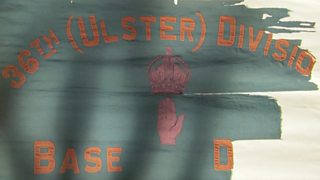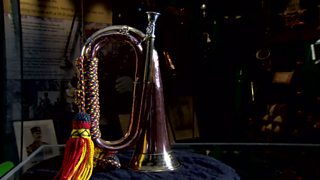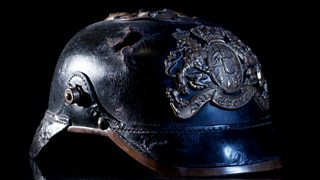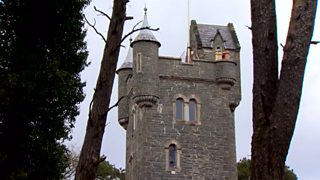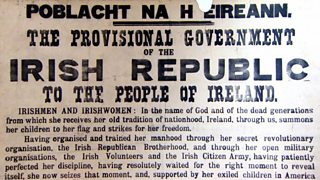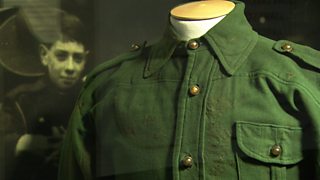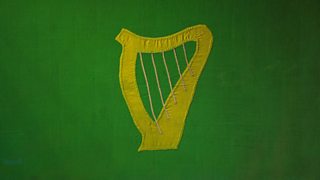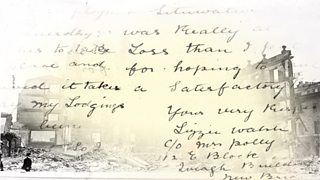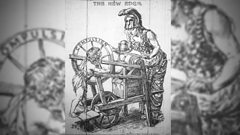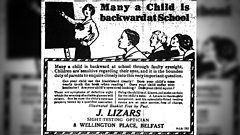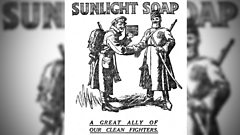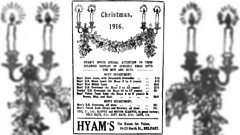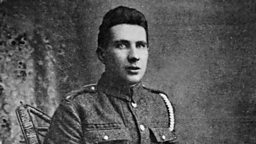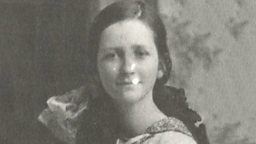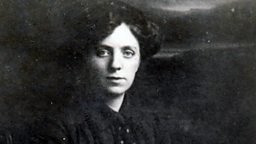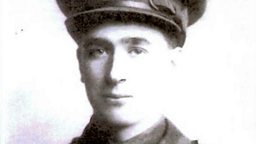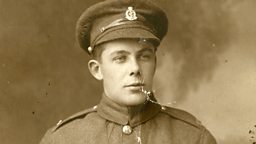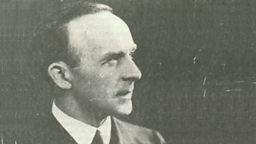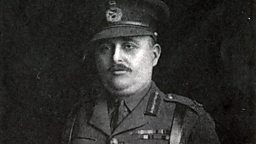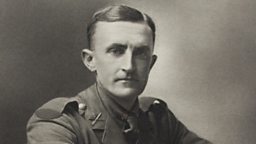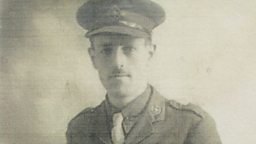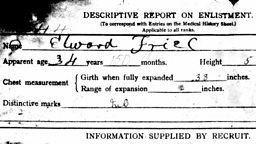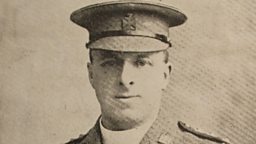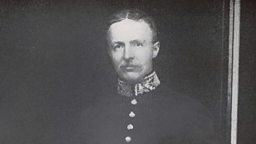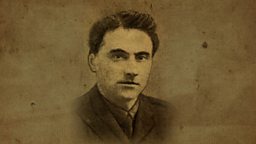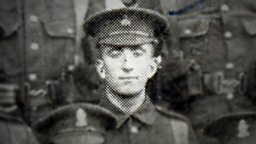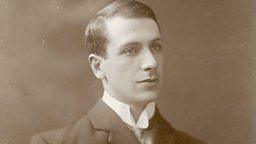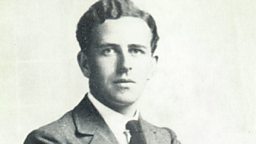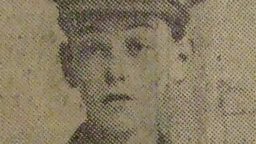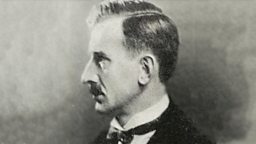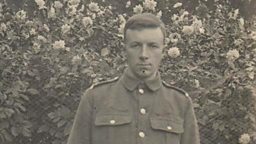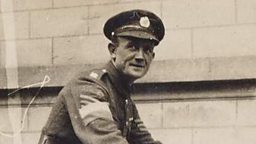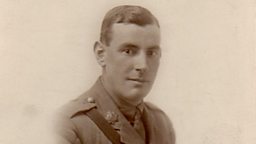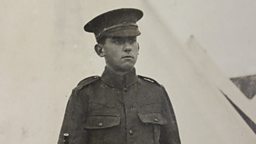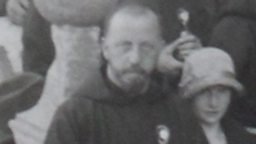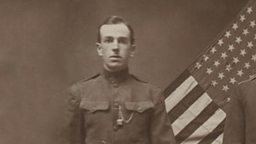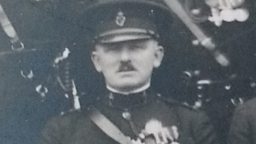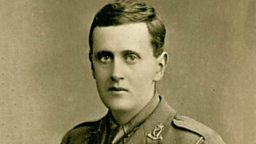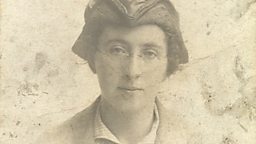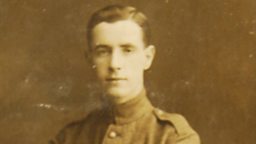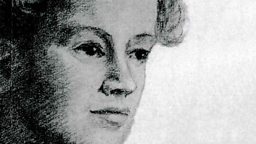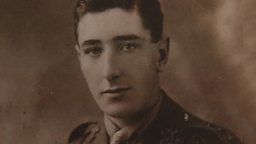Hugh James Adams
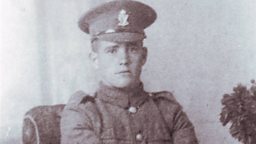
16th Pioneer at the Somme
Hugh James Adams was born in 1895, in the village of Crossgar.
They were lying in their dozens, wounded and dying
In interview in his later life, he says he attended school there, and was listed as a scholar in the 1911 Census. His mother, Margaret, was then an embroiderer, and his father William John a farm labourer.
Hugh James was "very sick when I was young", he recollects, and this disrupted his schooling.
Hugh James then recalls working at a local flax mill. In his spare time, he says he enjoyed playing in a flute band. He joined the Ulster Volunteer Force, and trained with them locally.
Then, on 8 February 1915, he enlisted with the 16th Royal Irish Rifles (Pioneers), 36th (Ulster) Division.
Joining up and training
Hugh James recalls that "I was over 19" on joining up. The training was, he says, "tough going."
He remembers being on the "big march in Belfast" with the Ulster Division as it left for England, and subsequent training there before embarking for France, and landing at Le Harve.
Army life
Hugh James says that conditions, on arrival in France, "weren't too good. You see it was ... something new in their Army, to have such a big Army." His impression was, he says, that "They didn’t know what they were doing."
The Somme
The 'worst place'
Of the Somme, Hugh James recollected simply: "That was the worst place."
Of the bombardments before the battle on the first of July, he says, "they thought you see that the troops had nothing to do but just get up and walk over."
But, he says, this was not the case: "you see he [the German soldier] was in these big deep dugouts, he was on the defence, on the offence we had nothing, we were lying in the open ..."
Once the men started to go over the top, Hugh James remembers, they found that "all wasn't blew away as they thought it would be ... up comes the machine guns ..."
"You may as well have been caught in a hailstones storm ...", Hugh James says.
In his opinion, "you couldn't escape."
First casualties
Hugh James himself, he says, was on ambulance duty: "After the soldiers went over the top on July 1, I was in the van on ambulance duty with another man from Belfast."
Positioned at Aveluy Wood, they were sent up in order to carry the wounded back.
"The first casualties I saw were from the 9th Battalion Riflemen. There were eight of them", he says. "I saw too many."
Shell lit beside me
Hugh James recalled his own very near-miss on 1 July: "... we were just at the end of the trench you see where we were, it was very bad, it was terrific. They were lying scattered every place. And a staff officer come round, and he says to my officer ... recommend that squad, well that meant a medal or something, MM or a DCM you know, we weren't thinking of medals, I may tell you."
He continues: "... he wasn’t out of sight when the shell lit beside me ... and it was a pretty heavy one ... it was not more than six feet away from me. And it got the officer in the front of me and it got the fella behind me and I was in the middle. And it blew my gas helmet off. And my officer ... his heart was cut out."
Having survived, however, he says he was told to go back out: "I went back to Aveluy Wood, just behind the trenches, across the river, I reported and they gave me another officer and I had to go out again with the next officer. So that's the way it went. It was tough."
He says that he found: "The casualties were that many the doctors told me not to bring any more in. They were lying in their dozens, wounded and dying and nobody to lift them."
Wiped out
Overall, Hugh James says, the Ulster Division "fellas went too fast, you see the Division on our right and the Division on our left, they halted, but our fellas went on, took them on, they went so far they got through to the fourth line." But, he recalls, "they had to come back again."
In summary, Hugh James says, "they were wiped out ... there was battalions there was nothing left hardly."
He recalls: "It was a real slaughter. You just couldn't cope with it. A lot lost their minds and came home shell-shocked but I didn't."
Wounded at Messines
Next, Hugh James says, "we went to Messines from the Somme."
There, he recalls "I was wounded on the first of June at Messines before the battle started ..."
He recollects how dangerous their location was: "we were making slip trenches there you see to bring the reinforcements in before the battle ... you daren't go out in the day time because there was a road they called ... Suicide Road, there was so many getting knocked out on it."
As a consequence, "promotion was very rapid because you were made a sergeant today and you were knocked out tomorrow and another fella got your place, that’s the way it went."
He says, "the sergeant was killed there and I ... took his place – and I was wounded." That was, he says, "the finish of me in the battle", and he "was out of action for quite a while."
Beyond imagination
Hugh James Adams continued his Army service throughout World War One, being promoted to Sergeant, until he was demobbed in 1919. He says, "I had a slight touch of mustard gas before the armistice was signed. I couldn't believe that it had been signed."
Of the aftermath of the war, he stated: "Young fellows were slaughtered from all over the place. Families were in a terribly low state because they were all hit with it. It wasn't only our family, there was somebody lost out of every home."
He says that after some time spent in Canada, he returned, and started up a successful business. He married, had a family, and lived a long life, dying in 1997.
Of his World War One experiences, he concluded: "I would die first I would come through it again ... No I couldn't tell you what it's like, you'd have to see it. You know. It's beyond imagination."
These pages are based on personal testimonies and contemporaneous accounts. They reflect how people saw things at that time and are not meant to be a definitive history of the period.
Voices 16 objects
Voices 16 galleries
Credits
Thanks to Hugh James Adams' family for image and information.
Hugh James Adams' testimony comes from an oral interview, courtesy of The Somme Association, and from an interview in the Down Recorder, published 17 November 1993, to whom thanks also.
